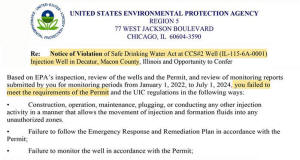ADM carbon sequestration project violated Safe Drinking Water Act, per
EPA
 Send a link to a friend
Send a link to a friend
[September 14, 2024]
By ANDREW ADAMS
Capitol News Illinois
aadams@capitolnewsillinois.com
 DECATUR – Agribusiness giant ADM violated federal regulations, a federal
permit and the Safe Drinking Water Act earlier this year when a
monitoring well at their carbon sequestration site in Decatur leaked
liquified carbon dioxide into “unauthorized zones,” according to the
U.S. Environmental Protection Agency. DECATUR – Agribusiness giant ADM violated federal regulations, a federal
permit and the Safe Drinking Water Act earlier this year when a
monitoring well at their carbon sequestration site in Decatur leaked
liquified carbon dioxide into “unauthorized zones,” according to the
U.S. Environmental Protection Agency.
In an August notice, the federal regulatory agency also alleged the
company failed to follow proper emergency response and remediation plans
after it identified the leak.
ADM’s carbon injection facility is the first and only project of its
kind in the country. It stores more than 4.5 million tons of carbon
dioxide generated from industrial processes at a company facility in
Decatur more than a mile underground. The project began operation in
2011.
The leak was first detected in March, according to an Aug. 22 letter to
the EPA from the company, although the company had known about corrosion
in tubing at the well since October 2023.

In the original notice of violation, EPA’s director of enforcement and
compliance for the region, Michael Harris, told ADM that the issue could
be grounds for an “enforcement action, including administrative and
civil judicial penalties” and that ADM’s permit for the project could be
terminated.
ADM spokesperson Jackie Anderson said the company is now working with
the EPA to address the issue.
“That monitoring well was plugged, is not in use, and none of the other
wells were impacted,” the company said in a Friday statement. “At no
time was there any impact to the surface or groundwater sources or any
threat to public health.”
Roughly 8,000 metric tons of liquid carbon dioxide and other ground
fluid was leaked. This is equivalent to about three days' worth of
injection, according to Anderson.
The leaked carbon dioxide stayed about 5,000 feet below ground, well
below groundwater in the area, which is about 200 feet beneath the
surface, according to a company document.
The Illinois Clean Jobs Coalition, a group of labor organizations and
environmental advocates, were quick to criticize the company on Friday
for failing to notify the public of the problem.
“There are significant risks at every step of the CCS (carbon capture
and sequestration) process, and it’s not a matter of if carbon
sequestration facilities leak, but rather when,” the coalition said in a
statement. “Neither ADM nor the USEPA have released any details about
the nature of the leak or its impacts on the local community,
groundwater, or the environment, and we are anxious to learn more.”
[to top of second column]
|

The U.S. Environmental Protection Agency issued a notice of
violation to ADM that a well at its carbon dioxide storage facility
in Decatur violated its permit. (Capitol News Illinois illustration
with highlights added)

The coalition also characterized the lack of public disclosure as
“unacceptable and dangerous.”
Anderson noted that the company reported the situation to the EPA “in
accordance with our permit requirements when there is no potential
endangerment to an underground source of drinking water, which was the
situation here.”
Other critics of the technology said the risks of carbon capture
outweigh the potential benefits.
“This leak is a wake-up call. It’s a stark reminder that carbon capture
is not the climate solution it’s sold as, but a dangerous gamble with
our drinking water,” Pam Richart, co-director of Eco-Justice
Collaborative, said in a statement.
Earlier this week, Rep. Carol Ammons, D-Urbana, filed a bill that would
prevent other carbon sequestration projects from being built in areas
where the sole source of drinking water is an underground aquifer.
This legislation follows a law passed earlier this year that lays out a
state-level regulatory framework for CCS projects. Despite being praised
by its proponents as a nation-leading piece of legislation, the law
passed earlier this year does not contain any specific protections for
large sources of drinking water.
ADM’s project is not subject to the new requirements outlined in that
bill, and the company supported it when it was being considered by the
General Assembly.
This was the subject of heated legislative debate as several lawmakers
called for more protections for the Mahomet Aquifer, which serves areas
around Rantoul, Champaign, Clinton, rural Tazewell County, Mason County
and more.

“The Mahomet Aquifer, which sustains nearly a million people in Central
Illinois, cannot afford to be put at risk by experimental technologies
like carbon capture and storage,” Richart, who supports Ammons’
legislation, said.
That legislation, House Bill 5874, could be considered when lawmakers
return to Springfield this November for their fall veto session.
Capitol News Illinois is
a nonprofit, nonpartisan news service covering state government. It is
distributed to hundreds of print and broadcast outlets statewide. It is
funded primarily by the Illinois Press Foundation and the Robert R.
McCormick Foundation, along with major contributions from the Illinois
Broadcasters Foundation and Southern Illinois Editorial Association. |